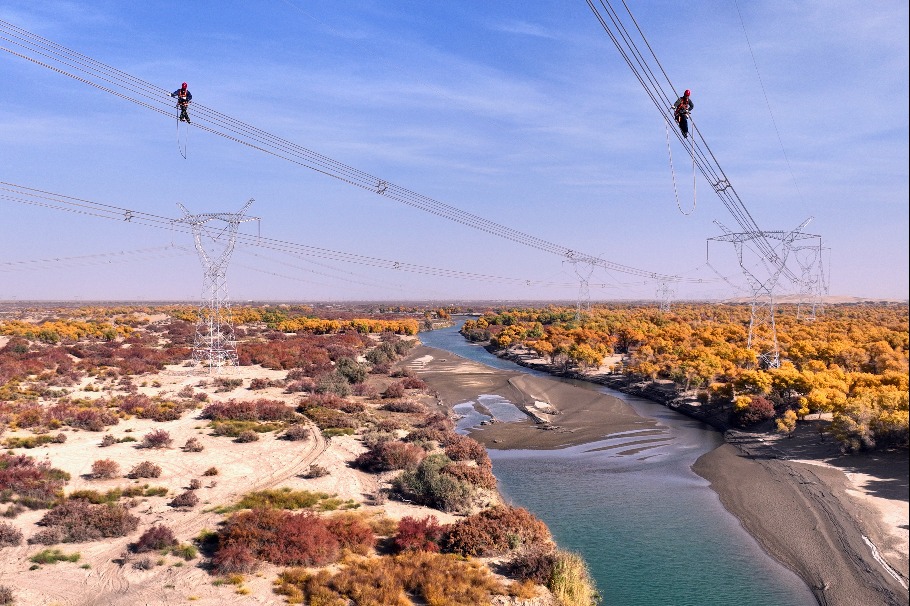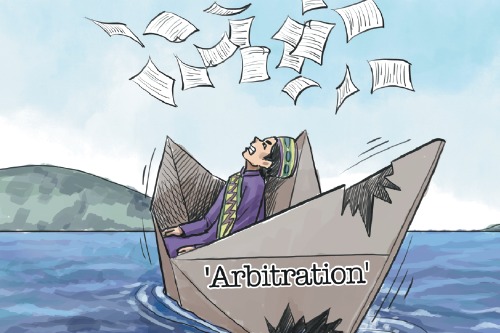United we stand


Countries should maintain the global multilateral system, control the escalation of geopolitical risks through dialogue and enhance the resilience of supply chains
From great power competition to widespread regional conflicts, the global geopolitical landscape has turned into a dynamic of multipolarity. Geopolitical tensions have led to the fragmentation of global trade and investment along ideological lines. However, all countries cannot avoid the looming threats of blocked corridors, rising costs and supply chain fragility that have already been taking their toll on multilateral trade and open economies.
Geopolitical risks have reduced the efficiency of the global supply chains. Europe and the United States' so-called de-risking policies in the name of economic security will further lengthen the global value chain, which will impact greatly on global welfare, prices, imports and economic growth. The supply process from raw materials to finished goods, which could have been achieved within China, is now being split into a number of global segments with unnecessary production unbundling. Maria-Grazia Attinas, an economist at the European Central Bank found in 2023 that the largest loss in global welfare would be between 12.8 percent and 20.6 percent if East and West were to be generally decoupled.
In the extreme case of strategic geopolitical decoupling, according to Attinas's research, global imports would lose between 6 and 9 percent of the current total volume, and in the case of decoupling of regional trade blocs, the losses would be as high as 35 to 44 percent, with trade in intermediate goods falling by 29 to 38 percent. Marijn Bolhuis, an economist of the Strategy, Policy and Review Department of the International Monetary Fund, found that an East-West decoupling would result in 2.3 percent output loss of global GDP, equivalent to the size of the French economy. Permanent losses in developed economies and emerging markets will amount to 2 to 3 percent of GDP, and losses in low-income countries will exceed 4 percent.
Already, affected by the Red Sea crisis, the growth rate of export container tariffs on the China-Europe and the Baltic-Red Sea routes has been soaring since the beginning of April this year, from 45.7 percent and 33.9 percent year-on-year in April to 240 percent and 125 percent in August. The Red Sea crisis affects shipping from China to Europe, and the shipping time around the Cape of Good Hope increases by about 15 days. These serious costs are ringing the death knell for the economic globalization that has prospered for decades.
In the face of economic challenges posed by geopolitical risks, all countries should work together to safeguard the multilateral trading system and avoid economic fragmentation, while providing protection for the most vulnerable economies. Geopolitical differences should be resolved through dialogue and cooperation, not confrontation. Only by joining hands can countries minimize the negative impact of geopolitics on global trade and economics and ensure the sustained and healthy development of the global economy.
Economies, whether developed or developing, have reasons to maintain and reform the existing multilateral trading system. The top priority lies in strengthening the functioning of the World Trade Organization, especially its dispute settlement mechanism, so as to prevent the proliferation of unilateral trade barriers. In areas where national preferences are largely aligned, countries should push for high-impact reform through multilateral efforts. For areas of divergence, deeper integration through regional trade agreements could be considered, while maintaining an open and non-discriminatory approach to other countries. In addition, credible safeguards, such as safe corridors for food and medicine, can be established to protect vulnerable countries and mitigate the impact of global spillovers.
In this respect, China has persisted in promoting multilateralism and global economic integration, and sought cooperation with Western countries in areas of common interest, such as climate change and global health. China also needs to deepen economic and trade relations with developing countries to help them cope with the impact of geopolitical divisions, and deepen economic and trade cooperation with traditional trading partners such as the Association of Southeast Asian Nations, the European Union and Latin America, and actively develop the Belt and Road Initiative.
Moreover, China can accelerate the construction of a global network of high-standard free trade zones, and build a Global South economic and trade network. Apart from that, China can strengthen regional economic and trade cooperation with ASEAN, Central Asia, South Asia, and Central and Eastern Europe, and push forward the development of energy resources, infrastructure construction, agriculture, and other traditional areas. China will continue to play a more active role in international organizations and promote reform of global economic governance. It will also play a stable and reliable role in the global industry chain by further deepening reform and opening-up, so as to safeguard the security of the global supply chain.
Western countries should be prudent when imposing trade sanctions and restrictions. They should avoid exacerbating global economic fragmentation and endeavor to maintain economic ties with emerging markets and developing countries. This is not only conducive to the maintenance of global economic stability but also in the long-term interest of Western countries. Countries around the world should actively maintain the normalization of the global multilateral system, control the escalation of geopolitical risks through dialogue and communication, reduce geopolitical distortions and interventions in economic laws, enhance the resilience of supply chains, and reduce the impact of geopolitical risks.
The author is an assistant research fellow of the Institute of World Economics and Politics at the Chinese Academy of Social Sciences. The author contributed this article to China Watch, a think tank powered by China Daily. The views do not necessarily reflect those of China Daily.
Contact the editor at editor@chinawatch.cn.


































